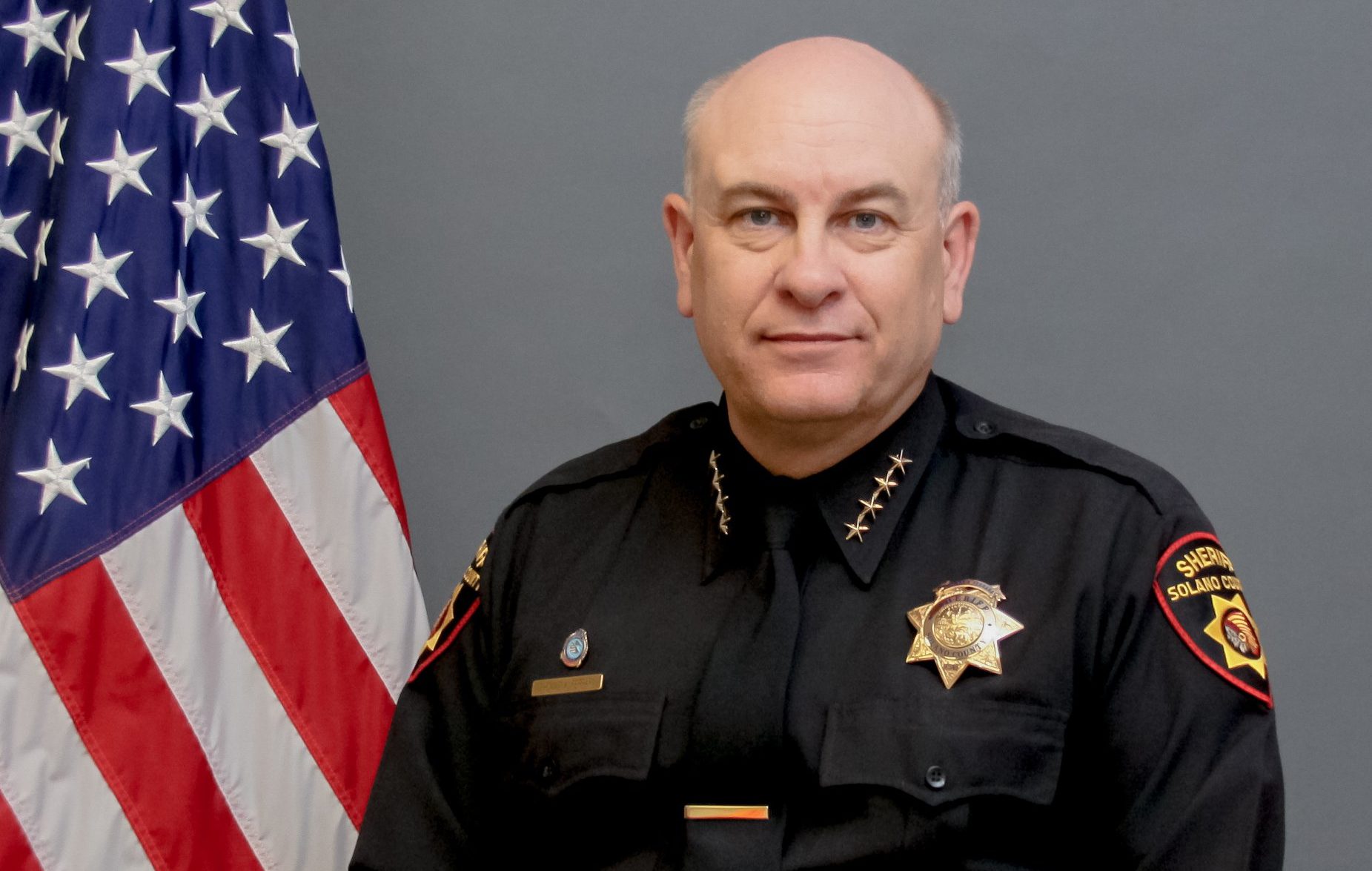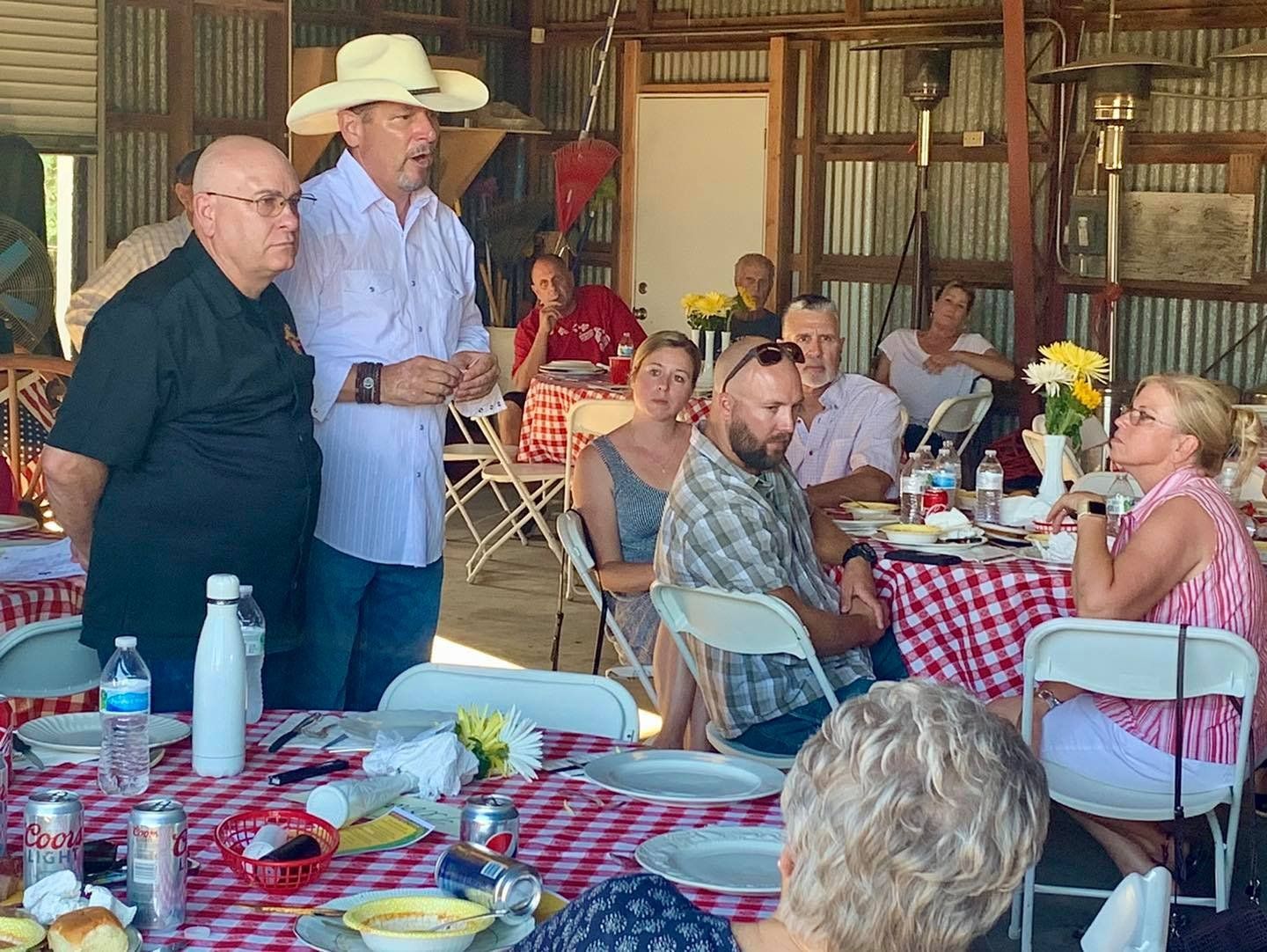In recent months, the Solano County Sheriff’s Office has faced a string of scandals, from deputies’ apparent support for anti-government militia groups to allegations of excessive force and dishonesty by deputies and a lack of discipline by Sheriff Tom Ferrara.
The revelations about the sheriff’s office have prompted calls for new oversight of the sheriff, an elected position that is largely autonomous from other sections of county government. The county Board of Supervisors has budgetary authority but no direct influence on the actions of the sheriff.
That could change as activists have finally succeeded in convincing the Board of Supervisors to consider forming an oversight body with subpoena power to investigate the sheriff’s office. A new state law passed last year granted the supervisors the authority to create such a board but supervisors have for months resisted calls to even discuss it.
But new allegations that two deputies beat a Black woman unconscious appeared to mark a tipping point, and Supervisors Monica Brown and Erin Hannigan agreed to schedule a meeting on sheriff’s oversight for Tuesday.
“The community needs to speak through their elected representatives that they’re not willing to accept their police officers engaged in such misbehavior,” said Michael German, a retired FBI agent who specialized in domestic terrorism and now studies law enforcement at the Brennan Center for Justice.
Last year, German published a paper on racism and right wing extremism infiltrating law enforcement and how to address it.
“The key is transparency,” German said. “As long as the public has access to this information, they can make better decisions when they choose their representatives and make their voice heard.”
Ferrara did not respond to requests for an interview.

Sheriff’s staff apparent support for Three Percenters
Ferrara’s troubles started in February with the release of an investigative report exposing that members of his staff had demonstrated support for the Three Percenter anti-government militia group on social media.
The Three Percenters are a loose-knit group that was formed after the election of President Barack Obama in 2008 and is preparing for a second civil war.
Its members were involved in a standoff with federal authorities in Oregon in 2016; a former sheriff’s deputy who led an Illinois Three Percenter group was convicted of bombing a mosque in Minnesota last year; and one of the men accused of plotting to kidnap the governor of Michigan was the leader of a Three Percenter group. Several Three Percenter members have been charged in the Jan. 6 attack on the U.S. Capitol.
Recently, two members of a local faction of the Three Percenters were charged with plotting to blow up the Democrats’ Sacramento headquarters.
The members of the sheriff’s office found to be posting Three Percenter symbols on social media included Sgt. Cully Pratt, the department’s former public information officer whose brother, actor Chris Pratt, has helped promote the sheriff’s office on social media.
In one post, Cully Pratt posed with a rifle display board he made for fellow sheriff’s Sgt. Roy Stockton featuring a Three Percenter logo surrounded by shotgun shells above the words “WILL NOT COMPLY.” Stockton was elected to the Vacaville City Council last year and sold metal and leather crafts with Three Percenter symbols online.
Deputy Dale Matsuoka, the department’s homeless outreach coordinator, has also repeatedly displayed Three Percenter support on his Facebook page, where he goes by the alias “Matt Daley.”
Sheriff Ferrara did not investigate reports of extremism in his office
The sheriff was reluctant to investigate. Ferrara declined to comment for the original story but released a statement days later, after the story was widely shared. Ferrara denied any misconduct by employees and said he had “personal conversations with the employees in question” who told him “their intention was to support the 2nd amendment and the U.S. Constitution.”
He denied that the deputies supported any extremist organizations.
But many people were unsatisfied with the sheriff’s response. Elected officials called on Ferrara to conduct a thorough investigation. In March, the Solano County Democratic Central Committee sent a letter to Ferrara asking him to condemn right wing extremism and “eliminate any possible influence” in the sheriff’s office.
Benicia Black Lives Matter sent another letter demanding that the sheriff pledge to conduct a full investigation and ensure that policies and procedures are in place “to actively expel these extremists from the ranks of law enforcement and prevent their recruitment in the first place.”
Ferrara sent responses to both claiming that the FBI had cleared the deputies involved. “I have consulted with the FBI who confirmed none of my employees are members of any extremist organizations,” Ferrara wrote in a March 22 letter to the Democratic Central Committee and again in an April 12 letter to Benicia Black Lives Matter.

Records revealed that Ferrara had consulted with Special Agent in Charge of the FBI’s Sacramento Field Office Sean Ragan. But the FBI’s Sacramento office disputed that they had advised the sheriff that none of his employees had extremist ties. An FBI spokesperson said that the FBI would not investigate sheriff’s deputies’ connections to extremist organizations unless they were suspected to be connected to a crime.
Former FBI officials concurred that the FBI was unlikely to make such a statement to Ferrara. “A disciplined and honorable leader of an agency would not make a public statement contrary to what they know is the truth about the status of an FBI inquiry,” said John Bennett, former special agent in charge of the FBI’s San Francisco field office.
Meanwhile, the Solano Community College District, which contracted with the sheriff’s office for policing services, challenged Ferrara on the investigation. In response, Ferrara withdrew from the contract in March, costing his budget nearly $1 million per year.
As the sheriff refused to investigate the extent of extremism in his agency, members of Benicia Black Lives Matter then sought a different agency to investigate the sheriff.
New state law allows county supervisors to enact oversight of the sheriff’s office
As a countywide elected position, sheriffs in California have little oversight. Unlike city police departments where the chief of police is a hired position that can be removed by the mayor or city council, sheriffs must lose an election to lose their jobs. And while elections could in theory be an accountability mechanism, often sheriffs run unopposed, in part because of a requirement that candidates must have previous law enforcement experience.
The county’s elected Board of Supervisors has limited oversight. In most counties it is limited to authority over the sheriff’s budget, with no say in how sheriffs run their agencies.
A new state law passed last year seeks to change that. Introduced by Assemblymember Kevin McCarty, D-Sacramento, AB 1185 allows county residents or the Board of Supervisors to vote to create an oversight board of their sheriff’s office. The board would be able to subpoena the sheriff for records, legally compelling the sheriff’s office to produce them.
In April, members of Benicia Black Lives Matter started calling into Board of Supervisors meetings asking the supervisors to create such a board. But when Supervisor Monica Brown, who represents Benicia, sought to add the discussion to a future meeting agenda, none of the other four members supported it. Despite that, the activists continued to push for an oversight board.
Benicia Black Lives Matter also asked the county’s civil grand jury to conduct an investigation into extremism in the sheriff’s office.
Agencies won’t monitor officers’ use of social media
The Solano County grand jury issued a report in June evaluating bias trainings in area police departments but also addressed extremist infiltration. Among other things, the grand jury recommended that Solano County law enforcement agencies monitor staff’s social media postings for extremist content, keep current on the technologies used by their employees and look for technological means to monitor social media postings.
The agencies mostly rejected these recommendations. Ferrara wrote in a legally mandated response that he would “look into this on a case by case basis when information is brought to our attention regarding social media posts that may have extremist content.” Using technological means to monitor employees’ online speech would violate their First Amendment rights, he said.
Other police agencies in the county had similar responses and said that they would continue a complaint-driven approach to responding to extremism. Fairfield police said that the department was prohibited from actively monitoring employees’ social media accounts by the state labor code. Dixon police also cited practical staffing challenges.
Only Vacaville interim police Chief Joseph Allio said that his department would look into implementing technological monitoring of officers’ social media accounts. “The department understands that members of law enforcement have certain restrictions regarding what they can post while representing their agency,” Allio wrote.
David Greene, senior staff attorney and civil liberties director of the Electronic Frontier Foundation, agreed that broad monitoring of speech by officers could violate their First Amendment rights and set a dangerous precedent for police or government agencies to monitor employees or activists for ideological speech.
"Any time the government searches without individualized suspicion should concern any of us,” Greene said.
"We do a lot of work looking at how law enforcement is monitoring public activity for the purposes of breaking up activist groups and break up and undermine protests so we’re really sensitive to the idea that there should be monitoring of public social media,” Greene added. “The policy is a little different when it's public employees and maybe even more so for police, but it's something we don’t want to take lightly.”
German, the former FBI agent who studies extremist infiltration in law enforcement, also raised concerns about giving police broad power to search social media and said it could be used to target groups protesting police misconduct or union representatives. Indeed, some police departments already conduct broad surveillance of groups involved in racial justice protests.
Any social media monitoring “should be driven by misbehavior rather than giving police agencies authority to broadly monitor the behavior of its police employees in their private time,” German said. “Police departments have plenty of notice who the problem officers are and they don't have to go on social media and try to discern what some retweets mean, they need to address the racist misbehavior that’s already being reported.”
A broad investigation into social media posts by Oakland police
In January, the Oakland Police Department launched an internal affairs investigation into an Instagram account sharing racist and sexist memes about policing and appeared to have internal knowledge of the department. The account frequently posted jokes about brutalizing people and lying about it to their superiors.
While an independent investigation ordered by a federal judge found that Oakland police were initially slow to investigate the account, the department undertook an expansive investigation to determine who started the account and confiscated and searched 140 work phones from officers. Nine officers were suspended as a result of the investigation, which determined that the person who started the Instagram account had been fired for a fatal shooting in 2018.
The department has not named the officer who started the Instagram account, but five officers were fired for the shooting. The Oaklandside learned through state records that four of those officers have found other law enforcement jobs, including Sgt. Francisco Negrete, who now works for the Solano County Sheriff’s Office.
Oakland’s investigation into officers’ social media speech demonstrates a very different approach than the Solano County Sheriff’s Office. Experts say that Oakland’s investigation was possible under First Amendment protections because Oakland police officers used department-owned phones to interact on social media.
Greene, the EFF attorney, said that the department could look at the phone to see if an officer posted a racist meme on an extremist website. “If they were devices that were owned by the employer and equipment for doing someone’s job," he said, "that's legitimately monitoring the use of their equipment.”
German, the former FBI agent, agreed. “There’s a limit to what you can use on a work phone and you obviously don’t have Fourth Amendment rights on a phone somebody else owns,” he said. “To the extent that you're doing your Christmas shopping on your government-issued phone, that's a misuse of government property and you can be disciplined for that.”
A new allegation of excessive force may be a tipping point for the sheriff’s office
In August 2020, Nakia Porter, a 33-year-old software engineer, was driving through Solano County on her way from Oakland to her home in Orangevale in Sacramento County. Her father was in the passenger seat and her two young children and niece were in the back seat.
At about 9 p.m., Porter was tired of driving and pulled over in rural Dixon to switch places with her father. She did not realize that two sheriff’s deputies were parked behind her when she stopped on the dark street. The deputies approached her as she was circling the back of her car and commanded her to get back in the car. At first, she moved toward the passenger seat, where her father was getting out, but when the deputies ordered her back to the driver’s side, Porter turned and went back.
“You know what, detain her,” Deputy Dalton McCampbell said in body camera video that was later released. McCampbell and the other deputy, Lisa McDowell, grabbed Porter and handcuffed her against her car. They then pulled her back to their patrol car, where McCampbell got on top of her and hit her until she was unconscious. The sheriff’s office said that Porter struck McCampbell in the face, but no video has shown that.
A year later, in August 2021, Porter sued the sheriff’s office and her attorney published body camera video of the incident. The footage quickly made national news and renewed calls for oversight of the sheriff’s office.
On Aug. 24, one week after Porter filed her lawsuit, Supervisor Monica Brown once more made a motion to discuss oversight of the sheriff’s office. This time, Erin Hannigan seconded it, and county staff were directed to schedule the meeting in October.
Johnicon George, president of the Tri-City NAACP — for Fairfield, Vacaville and Suisun City — called into the meeting to support an oversight board, citing the video of Porter’s arrest.
George said in an interview that he met with the sheriff to share concerns about the investigation into Three Percenter support, but after finding out about the Porter incident he decided to openly push for oversight of the sheriff's office.
“With Nakia Porter we have footage of sheriff's deputies terrorizing and brutalizing this family and then, on camera, giving false statements, lying and covering it up,” George said. “That’s just outrageous.”
Brandon Greene, a co-founder of Benicia Black Lives Matter, said in an interview that given the potential presence of Three Percenter ideology in the sheriff’s office, and particularly after the Jan. 6 attack on the U.S. Capitol, “It’s unfortunate that it took another incident of recorded police violence to move forward.”
Greene said he thinks there is a “voyeuristic aspect” for people of color because civic engagement is insufficient and there must be a viral video for demands to be met.
A majority of the Board of Supervisors have endorsed Ferrara
While the Board of Supervisors have agreed to discuss an oversight board, whether it will pass is another matter. Only Monica Brown responded to a request for comment about the upcoming meeting and said that she would support oversight. She said that her constituents support oversight and there were many reasons for it, but the “most glaring” was what happened to Porter.
“Ms. Porter is around my daughter’s age. Her father was in the car with her. I could not imagine that happening to my daughter, let alone having to watch it happen to her,” Brown said in a statement. “Her children were in the car with her. I could not imagine that happening to me and having my children witness it, particularly with how young Ms. Porter’s children are.”
But the three men on the Board of Supervisors — Mitch Mashburn, Jim Spering and John Vasquez — have already endorsed Ferrara’s reelection.
Mashburn is a former lieutenant in the sheriff’s office. When Mashburn left the Vacaville City Council last year to run for the Board of Supervisors, he endorsed sheriff’s Sgt. Roy Stockton — who sold Three Percenter crafts and was the deputies’ supervisor in the Porter incident — to take his place on the council.

If the supervisors were to enact an oversight board, German, the former FBI agent, said that it was most important to enable officers to come forward with complaints of misconduct without fear of retaliation. He said that in most cases, departments are aware of which officers may engage in racist misbehavior but a culture of silence and the permeation of such officers in the command staff means it is never addressed.
“What they need to do is establish effective whistleblower protections for department employees who point out who the wrongdoers are or cooperate in investigations of wrongdoing,” German said. “In most police departments it’s more threatening to your career to report racist misbehavior than to engage in racist misbehavior. As long as that’s true, it will be difficult to get the witnesses and testimony to effectively deal with the problem.”
Since the supervisors agreed to take up the meeting, even more allegations of misconduct have come to light about the sheriff’s office.
The Vallejo Sun revealed last month that sheriff’s Sgt. Jason Speakman was accused of sexually harassing a dispatcher in 2018. An internal affairs investigation recommended Speakman be fired, but at his disciplinary hearing, Ferrara decided to just demote Speakman for six months. The dispatcher was later fired and sued the county. A jury trial concluded in the lawsuit earlier this month.
Then earlier this month, a judge rejected felony charges against a man who was punched repeatedly and taken to the ground by sheriff’s Deputy Alvaro Pena inside a Fairfield courthouse. In making his ruling, the judge admonished Pena’s use of force.
McCampbell — the deputy accused of beating Porter unconscious — was sued for a similar incident in 2017. The lawsuit alleges that he chased a man, tackled him unnecessarily injuring his eye, punched him, and lied in reports by saying the man took a fighting stance. The county settled the lawsuit in 2019.
If the Board of Supervisors does not enact an oversight board, advocates could still use a countywide vote of residents to enact one.
But holding Ferrara accountable at the ballot box otherwise may not be possible. While he is up for reelection next year, his only challenger, Fairfield police Lt. Dan Marshall, has already withdrawn from the race. Despite running unopposed, Ferrara’s reelection campaign raised $9,000 in the first half of the year.
Greene, the Benicia Black Lives Matter co-founder who pushed for the oversight discussion, acknowledged that actually enacting oversight will be difficult due to the makeup of the county board.
“I think the long term project has to be more diverse, more robust representation on the Board of Supervisors,” Greene said. “Amidst other things that we’ve done, this is a huge victory even though I don’t know if there's going to be the political will to move forward. But racial justice to me is a generational challenge.”
Before you go...
It’s expensive to produce the kind of high-quality journalism we do at the Vallejo Sun. And we rely on reader support so we can keep publishing.
If you enjoy our regular beat reporting, in-depth investigations, and deep-dive podcast episodes, chip in so we can keep doing this work and bringing you the journalism you rely on.
Click here to become a sustaining member of our newsroom.
THE VALLEJO SUN NEWSLETTER
Investigative reporting, regular updates, events and more
- policing
- Solano County Sheriff's Office
- extremism
- Three Percenters
- militia
- Tom Ferrara
- Solano County Board of Supervisors
- Monica Brown
- Erin Hannigan
- Michael German
- Cully Pratt
- Roy Stockton
- Dale Matsuoka
- Benicia Black Lives Matter
- FBI
- Solano Community College District
- Fairfield Police Department
- Dixon Police Department
- Vacaville Police Department
- David Greene
- Oakland
- Oakland Police Department
- Nakia Porter
- Dalton McCampbell
- Lisa McDowell
- Johnicon George
- NAACP
- Brandon Greene
- Jim Spering
- John Vasquez
- Jason Speakman
- Alvaro Pena
- Dan Marshall
- Mitch Mashburn
- AB 1185

Scott Morris
Scott Morris is a journalist based in Oakland who covers policing, protest, civil rights and far-right extremism. His work has been published in ProPublica, the Appeal and Oaklandside.
follow me :




